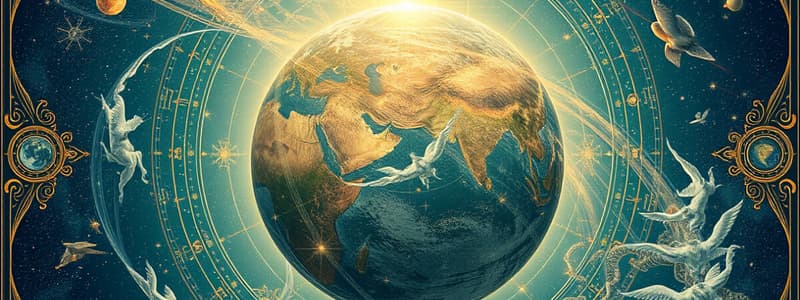Podcast
Questions and Answers
What is one major focus of meteorologists?
What is one major focus of meteorologists?
- Forecasting weather patterns (correct)
- Tracking celestial movements
- Studying the ocean currents
- Analyzing geological formations
Dark matter constitutes only 5% of the total matter in the universe.
Dark matter constitutes only 5% of the total matter in the universe.
False (B)
What percentage of the universe is believed to be dark energy?
What percentage of the universe is believed to be dark energy?
- 82%
- 12%
- 45%
- 68% (correct)
What ancient civilization kept a record of earthquakes?
What ancient civilization kept a record of earthquakes?
The study of the origins, history, processes, and structure of the solid Earth is known as __________.
The study of the origins, history, processes, and structure of the solid Earth is known as __________.
Dark energy can be directly detected and measured.
Dark energy can be directly detected and measured.
Match the following components of the universe with their descriptions:
Match the following components of the universe with their descriptions:
What branch of astronomy deals with the origin and evolution of the observable universe?
What branch of astronomy deals with the origin and evolution of the observable universe?
The primordial god KHAOS is associated with the culture of __________.
The primordial god KHAOS is associated with the culture of __________.
Which branch of Earth science studies waves, tides, and ocean currents?
Which branch of Earth science studies waves, tides, and ocean currents?
Astronomy is the youngest branch of Earth science.
Astronomy is the youngest branch of Earth science.
Match the following cultures with their creation myths:
Match the following cultures with their creation myths:
What is the primary material that makes up normal matter in the universe?
What is the primary material that makes up normal matter in the universe?
Which of the following best describes dark energy?
Which of the following best describes dark energy?
In Iroquois mythology, Sky Woman created the Earth after falling into the ocean.
In Iroquois mythology, Sky Woman created the Earth after falling into the ocean.
What is the role of Vishnu in Hindu mythology?
What is the role of Vishnu in Hindu mythology?
Flashcards are hidden until you start studying
Study Notes
Earth Science Overview
- Earth Science encompasses the study of Earth and its universe, employing observation and experimentation to understand natural phenomena.
- Notable contributions include:
- China: Oldest records of earthquakes and the invention of the first seismoscope (780 BC).
- Ancient Greeks: Early cataloging of rocks and minerals (200 BC).
- Mayans: Advanced tracking of celestial movements, represented in a disk-shaped calendar.
Branches of Earth Science
- Geology: Investigates the origin, history, and structure of solid Earth, including the study of volcanoes by volcanologists.
- Oceanography: Focuses on Earth's oceans, examining waves, tides, and currents.
- Meteorology: Studies Earth's atmosphere, particularly weather and climate, employing tools like Doppler radar for storm tracking.
- Astronomy: The study of the universe beyond Earth, recognized as the oldest branch of Earth science.
Importance of Earth Science
- Understanding natural forces aids in predicting disasters and managing natural resource conservation.
Components of the Universe
- Normal Matter (5%): Composed mainly of hydrogen and helium, includes stars and heavy elements.
- Dark Matter (27%): Essential for galaxy formation, interacts through gravity, remains invisible and undetectable by traditional means.
- Dark Energy (68%): The expansive energy of the universe, propelling galaxies apart; its nature remains largely unknown.
Cosmology
- A subfield of astronomy that explores the universe's origin, large-scale properties, and evolution.
Creation Myths
- Cultural narratives explaining the world’s beginnings include:
- Greek: KHAOS leads to Gaia (Earth), Tartaros (Pit Below), and Eros (Procreation).
- Hindu: Vishnu represents preservation while creating and transforming the universe.
- Egyptian: Atum, the self-created figure, is the origin of all excluding Shu and Tefnut.
- Norse: Ymir is a primordial being linked to Yggdrasil, a sacred tree.
- Chinese: Pan Gu emerges from chaos, separating heaven and earth.
- Japanese: Izanagi and Izanami are siblings who give rise to islands and kami (gods).
- Iroquois: The Sky Woman creates Earth with the help of birds and fish after falling from the sky.
Studying That Suits You
Use AI to generate personalized quizzes and flashcards to suit your learning preferences.




